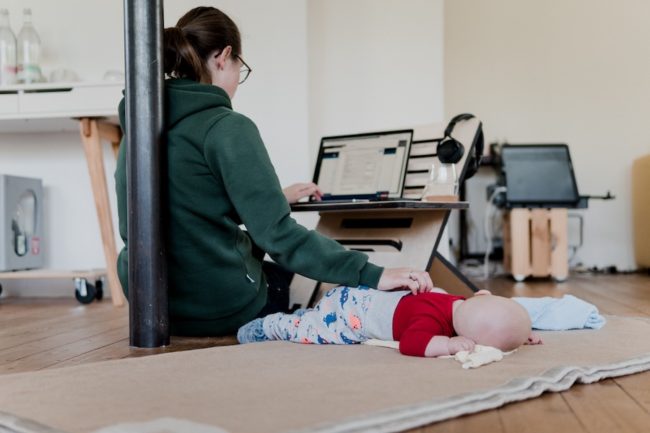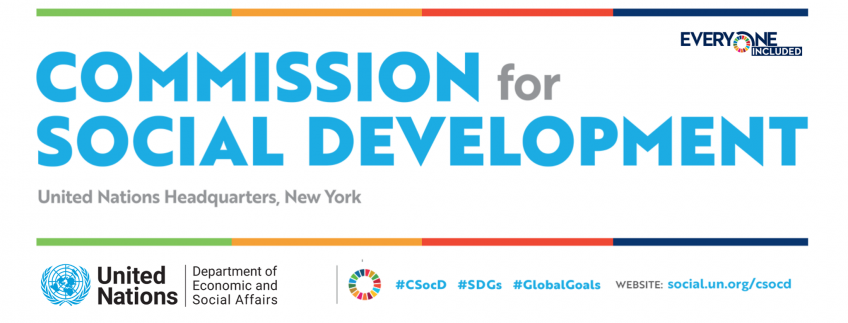Digital technologies for mothers: opportunities and challenges
18.01.21
UN New York, CSocD59 - MMM takes the opportunity of the upcoming 59th Session of the UN Commission on Social Development (CSocD59, Feb 8th to 17th), to draw attention to the role of digital technologies in mothers’ lives, their potential benefits and the challenges they pose.

Digital technology has already transformed societies and economies in many parts of the world, opening new ways to communicate, changing lifestyles and creating new types of employment. Information and Communication Technologies (ICT), in particular mobile technology, can notably benefit and improve the quality of life of families in remote areas, through access to health, education and financial services, fostering more inclusiveness.
Mobile Applications that have the potential to most benefit mothers and their children are those that support maternal and child health, or women’s financial independence (through “mobile money” or other financial services).
Mobile health (mHealth) applications are proving particularly promising for health promotion and education, as well as remote access to health services, thereby contributing to the realization of several SDG targets, notably target 3.1 (on Maternal mortality) and target 4.2 (Early Childhood Education & Care).
Some examples:
- The Society for the Elimination of Rural Poverty (SERP) in India has created a mobile system to track progress and support community health workers in the fight against maternal mortality and morbidity, as well as malnutrition.
- The mobile app JamboMama! , which is being tested in Tanzania, aims to connect women (and their communities) with qualified maternal healthcare workers (and the health care system in which they work). The objective, again, is to prevent complications during pregnancy and birth and saves the lives of mothers and babies.
- In the UK, “BabyBuddy” is a mobile app for parents to support early child development – a key factor for a child’s future success in life. It provides timely information and advice to parents during pregnancy and the first 6 months of their child’s life, thereby helping mothers/parents “look after their baby’s mental and physical health, as well as their own, and give their baby the best start in life”.
- More recently in the context of Covid-19, Mothers2Mothers, an MMM associate member based in South Africa, has created the Virtual Mentor Mother Platform for the sub-Saharan African region (Angola, Kenya, Ghana, Lesotho, Malawi, Mozambique, South Africa, Tanzania, Uganda). Utilizing WhatsApp, the platform enables the dissemination of WHO’s prevention messages and other relevant information that are translated into more than 30 languages, thereby reaching a wide audience.
ICTs can also contribute to reduce the time that mothers spend on unpaid family care work, simply by facilitating everyday life through easy communication and remote access to information and public services.
Unfortunately, many of these benefits remain elusive, especially for marginalized populations. Digital technology also creates new inequalities or exacerbates existing ones. Digital divides are multiple and intersect to reinforce each other: for many mothers, the gender digital divide is compounded by the urban/rural divide, social norms and gender stereotypes, as well as disparities in income, education and digital literacy.
In most cases, access is linked to pre-existing infrastructures, beginning with electricity. Even though electrification has been accelerating in the past years, the UN estimates that 850 million people remain without this basic service. And even when families have access to electricity and networks, affordability of services and devices remains an issue.
Even if they can access the Internet, mothers face specific challenges made even more acute and visible because of the Covid-19 crisis:
- Remote schooling: mothers are usually the ones “in-charge” in families – much more than fathers, and this responsibility collides with their own work obligations. Many also lack digital literacy to support their children in accessing online courses. And of course, many families must face the simple fact that the lack of adequate computer or internet access makes remote learning an illusion for their child who risks being left behind.
- Teleworking: for those who are able or obliged to telework, childcare obligations might make it impossible for mothers to attain a reasonable work-life balance. The right to disconnect has also become an issue, and many mothers, much more than men or women without children, have lost their jobs during the pandemic.
- Managing children’s screen time, protecting them and controlling internet content: many parents feel powerless when it comes to setting the right balance in ICT use for their children, finding suitable content, and preventing online violence or access to inappropriate content.
These challenges must urgently be recognized and addressed, by both governments and the private sector.
In this particular context, MMM makes several recommendations and calls on governments and other stakeholders to:
- Take action: Covid-19 and its economic devastation offer a unique opportunity to promote digital technology for wellbeing, This requires policies to reduce the multiple technological divides and so that it contributes to the realization of the objectives of the Agenda 2030 in a cross-cutting inclusive approach encompassing innovation, environmental and human issues for sustainable social development.
- Ensure remote learning for all. Promote the creation of policies of affordable internet for all. Help children to continue their formal education despite the pandemic. Education, especially girl’s education, and care must not be considered as expenses but high return investments.
- Harness the huge potential of mobile health services (mHealth) and expand remote access to reproductive, maternal, newborn, and child health (RMNCH). As pointed out by the Early Childhood Peace Consortium, mHealth innovations support health service functions such as health promotion, emergency medical response, data collection, point-of-care diagnostics, and clinical guidance.
- Support parents in their caring responsibilities thanks to digital technology.
The pandemic starkly challenges the choices that societies will have to make to build a better future for all and how this can be achieved. As noted by the UN Secretary General, “We are at a turning point. We urgently need to harness the infinite opportunities offered by digital technology in order to scale up our efforts on health care, on the climate crisis, on eradicating poverty and across all the Sustainable Development Goals.”

The 59th session of the UN Commission on Social Development (CSocD59) will take place 8-18 February 2021 with “Socially just transition towards sustainable development: the role of digital technologies on social development and well-being of all” as the priority theme.
Written statement submitted by MMM ahead of CSocD59 (with sources and references)
MMM’s written statement as UN Document (ref. E/CN.5/2021/NGO/31)
The New EU Gender Equality Roadmap : A Call for Inclusion of Mothers
04.03.25
The European Commission’s initiative on a new Gender Equality Roadmap post-2025, marks a significant step forward in addressing gender disparities across the European Union. Make Mothers Matter (MMM
Breaking the Cycle: Gender Equality as a Path to Better Mental Health
18.03.25
The Council of the European Union has taken a decisive step in recognising the vital connection between gender equality and mental health.
Europe Must Listen to Mothers: Our landmark report heads to the European Parliament
28.08.25
On 22 September 2025, the voices of mothers will take centre stage in Brussels. For the first time, Make Mothers Matter (MMM) will present its State of Motherhood in Europe








